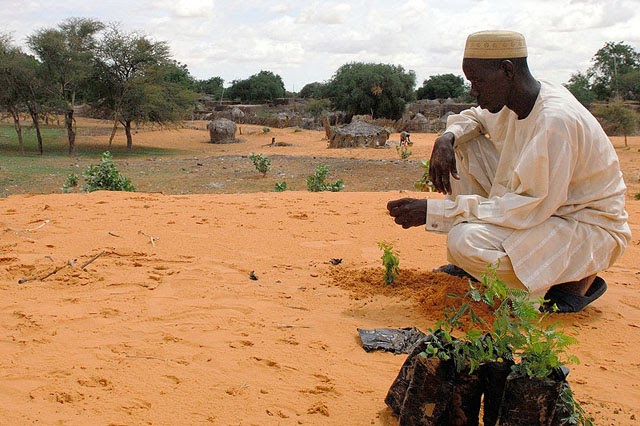UK #COP26 Presents An Opportunity For Nigeria To Build A Resilient Future
What Nigeria gets out of the global climate change summit depends heavily on negotiations and support from developed countries like the UK.

With the United Kingdom (UK) hosting the 26th United Nations Climate Change Conference (COP26), Nigeria has a unique opportunity to accelerate climate security action and guarantee a resilient future.
Nigeria is one of the most vulnerable countries globally to the impact of climate change-related extreme weather conditions.
The social, economic and human security impacts of climate change trends like erratic rainfall, high temperatures, severe flooding and desertification are exacerbated by rapid population growth, a fragile economy, underdevelopment, and weak adaptive capacity.
“Now more than ever,” observes environmentalist and scientific researcher Asmau Oniyangi, “the adverse effects of climate change in Nigeria are more obvious with sharp increases in extreme heat affecting the many millions of its citizens who do not have access to air conditioning or electricity and changes to precipitation threatening Nigeria’s largely rain-fed agricultural sector.”
COP26, scheduled to take place in Glasgow in Nov. 2021, will accelerate action towards the Paris Agreement’s goals and bring together heads of state, climate experts and activists to agree on a coordinated effort to address climate change.
Despite the summit’s postponement from Nov. 2020 due to the COVID-19 pandemic, the global health crisis is still posing a challenge. In early February, the United Nations chief, Antonio Guterres, was reported to have recommended that critical negotiations to prepare for the event should take place virtually.
For Nigeria, the postponement has created ample time for the government and negotiators to discuss with international and development partners on climate actions that benefit the country and reduce the impact of climate change.
On Feb. 11, COP26 President Alok Sharma arrived in Abuja and subsequently held high-level meetings with Vice President Yemi Osinbajo and President Buhari’s Chief of Staff, Prof. Ibrahim Gambari.
They discussed the importance of Nigeria’s leadership in climate action, energy transition, adaptation and green growth.

During a reception at the residence of the British High Commissioner, Catriona Laing, the COP26 President listened to young climate and environmental activists’ concerns from diverse backgrounds.
The COP26 President’s visit will build momentum for young people’s continuous engagement in climate space with the UK Government, notes Seyifunmi Adebote, an environmentalist and climate activist. He adds that this will redefine how young people are considered in negotiations and international policymaking.
Sharma’s visit took place against the backdrop of ongoing engagements and partnership between Nigeria and the UK, a long-time ally and host of the Climate Summit.
“Climate change remains a global concern that requires collective efforts, and this visit underlines the UK’s support for Nigeria in its battle against climate change while highlighting some of the important work we have already done together to protect livelihoods, lives and the planet,” said the British High Commissioner to Nigeria.
Seyifunmi told HumAngle that COP26 provides opportunities for Nigeria to attract green and environmentally friendly investment and businesses from the UK. The UK is a global leader on climate change with very ambitious goals to reduce emissions and has important technical and financial capacities to assist developing countries.
The Nigerian government’s ability to build a climate-resilient society and ensure COP26 delivers for its people depends heavily on favourable negotiations and support from developed countries like the UK.
The country is expected to cut greenhouse gas emissions by 20 per cent unconditionally and 45 per cent eventually, with international support by ending gas flaring, adopting climate-smart agriculture, and reforestation and clean energy transition.
Habiba Daggash, a post-doctoral researcher and expert in low-carbon electricity systems, in a paper stated that the rehabilitation of Nigeria’s ailing power sector would improve energy access and presents an opportunity to reduce emissions and health risks due to toxic emissions from diesel use.
She described the changing economics of renewable energy as an opportunity to develop a low-carbon energy supply that can power homes and industry without ballooning greenhouse gas emissions and stifling climate change mitigation efforts.
The UK is a strategic partner capable of building the ecosystem and expertise needed to transition to and expand renewable energy generation.
In January, it was reported that renewable energy outpaced the UK’s fossil fuel generation for the first time in 2020 and could remain the largest electricity source in the future.
HumAngle understands that Nigeria’s ability to integrate large scale renewable energy technologies such as solar and wind into the energy mix will reduce the need for dirty generators and provide an enabling environment for better productivity.
Britain is also an essential source of climate finance, investment and assistance to reverse and reduce the impact of climate change.
In 2019, British Prime Minister Boris Johnson announced before the UN General Assembly in New York that the UK would double its investment to help developing countries turn the tide against climate change and species loss.
Tackling biodiversity loss will slow desertification and the shrinking of fertile land, which plays a role in altering the migration pattern of nomadic herders and contributes to deadly battles between herders and farmers in Nigeria.
The UN climate summit also serves as an avenue for the Nigerian government through cooperation with international development partners to improve the resilience of its highly vulnerable agricultural sector and strengthen support for communities in the Northeast and Lake Chad, battling the dual impacts of climate change and conflict.
Support Our Journalism
There are millions of ordinary people affected by conflict in Africa whose stories are missing in the mainstream media. HumAngle is determined to tell those challenging and under-reported stories, hoping that the people impacted by these conflicts will find the safety and security they deserve.
To ensure that we continue to provide public service coverage, we have a small favour to ask you. We want you to be part of our journalistic endeavour by contributing a token to us.
Your donation will further promote a robust, free, and independent media.
Donate HereStay Closer To The Stories That Matter




